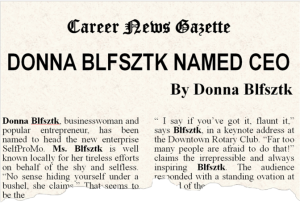Rebecca Lyles's Blog, page 9
January 17, 2015
Three common profile mistakes
 Your career profile on LinkedIn, your website, or your Facebook business page needs to give a quick overview of your skills and accomplishments. Busy people have short attention spans.
Your career profile on LinkedIn, your website, or your Facebook business page needs to give a quick overview of your skills and accomplishments. Busy people have short attention spans.
So if you’re trying to attract clients, investors, or potential employers, the profile is your 15-second opportunity to grab their attention.
Most of all, you want to avoid anything that makes the reader stop reading.
We’ll start by assuming you know that vague, overblown claims are useless. Phrases such as “various worldwide leadership roles” and “global impact on society” tell the reader nothing about what you can do or what you have done. Buzzwords and clichés sound like exactly what they are – filler. If your profile is loaded with these, rewrite it using more concrete evidence of your achievements.
Your profile sums up your potential value to readers. It’s all right to paint an honest, positive picture of yourself. Go ahead and tell your story, taking whatever credit you deserve for all you’ve done. But if you claim too much credit, remember that whoever really did the work might be reading it.
Make sure the facts you cite are related to what you actually contributed. It’s not impressive to claim, “I swept floors at a company headquarters building valued at $70 million.” If you designed, built, or decorated it, that’s another matter.
Once your profile is tight, specific, and compelling, check for these common errors:
Principle-principal
Are you a founder or major figure in a company? Then you’re a principal, not a principle. If your title is something like Principal Member of Technical Team, spell it right. Nothing erodes confidence faster than misspelling your own title. Would you trust someone who claimed to have a Doctor of Filosofy degree?
Lead-led
Describe your past experience in the past tense. Say you sold, managed, developed, supervised, delivered, or led (not lead) something. The past tense of lead is led. Lead – pronounced “leed” – is present tense and it means you’re still doing that job. Lead – pronounced “led” – is a soft, malleable metal.
Writing in third person
Your profile is about you and everyone knows you wrote it. It’s no secret, and no one expects it to read like a newspaper article written by someone else. People who write in third person seem to think it gives them license to brag about themselves without seeming immodest. In fact, it has the opposite effect. It seems disingenuous and awkward. If your experience and skills are strong, the facts speak for themselves without hype or pretense. Save third person for recommendations, when you are writing about someone else.
Cautionary tale: Years ago, a member of my university newspaper staff wrote a shamelessly self-serving article about herself. Her name was in the headline and in nearly every sentence of the article. She intended it to run with no byline, as if it were a genuine news piece. But the editor was so tired of her relentless self-promotion that he sent it to press with her name under the headline, credited as the writer. The next day, 20,000 students enjoyed a great front-page laugh with their morning coffee – at her expense.
Oops.
Like TextCPR on Facebook!
January 10, 2015
With a defense like this …
I’m all for brevity and efficiency in writing. Confusion often results when you try to cram too much information into one sentence. But journalists, especially headline writers, sometimes go too far.
In the olden days, newspapers (actually printed on paper) forced writers to fit limited spaces. “Column inches” were like expensive real estate that might be sold to advertisers. Paper-based journalism is still around, but shrinking, and its Internet cousin imposes space limitations of its own. As a result, writers have to pare their text down to bare bones. They start with a clear understanding of what they mean, but important words end up on the cutting room floor. And sometimes those discarded words make all the difference.
Writers misplace modifiers, substitute with short (and ambiguous) words, and omit critical information. Their articles and headlines provide us with a never-ending stream of funny items we can send to our friends or share in online forums.
Among my favorite “blooper” headlines:
Coal Miners Refuse to Work After Death
The article goes on to explain that a recent fatal mine accident makes workers fear for their lives. The miners believe the mine is unsafe, and will not return to work until the company implements some safety measures. For the sake of three letters, the writer chose “Death” instead of “Accident,” implying that the miners allowed a little thing like being dead to interfere with their duties. I could almost hear certain people saying, “Buncha sissies – that’s what you get for letting the unions in!”
Enraged Cow Injures Farmer with Ax
Apparently it was the farmer, not a cow with bovine spongiform encephalopathy, who had the ax here. But in the pursuit of brevity someone neglected to clarify that. If it had been the cow – without opposable thumbs – wielding the weapon, that would have been a different story. This version is two letters shorter: Cow Injures Wood-chopping Farmer.
Misleading articles and headlines with misplaced modifiers constitute another category of bloopers in print. Prepositional phrases are often the culprit, but you can’t blame them entirely. Poor things, they just do as they’re told and don’t choose where they’re placed.
Two Sisters Reunited After 18 Years at Checkout Counter
Turns out the sisters found each other, after an 18-year separation, in a chance encounter while shopping. But the headline implies that it took them 18 years in close proximity to realize they were sisters. You’d think one of them might have mentioned Crazy Aunt Ethel, or that foot with six toes, or some other family-specific tidbit. This version has fewer letters: Sisters Separated 18 Years, Reunite at Checkout Counter.
This one has to be my all-time favorite:
Oklahoma City bomber Timothy McVeigh was cremated and his ashes scattered at an undisclosed location after he was executed by his attorney …
This writer had no excuse. It was an article, not a tightly spaced headline. In trying to say that the attorney scattered the ashes, he implies legal services also included executing the defendant. One-stop shop. Save the taxpayers some money. No need for a prosecutor, judge, jury, and all that due process nonsense!
This whole thing could have been avoided by deleting the phrase “after he was executed.” He couldn’t have scattered ashes before the defendant was executed, now could he?
I don’t know about you, but if I needed a defense attorney, I’d think twice about calling this guy.
Just in case.
Like TextCPR on Facebook!
January 3, 2015
Just-wrong-enough word choices
 You’re only a letter or two off. And besides, everyone knows what you mean anyway. Is close enough really good enough? I’m not talking about obvious errors, but subtle word choices that might go (mostly) unnoticed.
You’re only a letter or two off. And besides, everyone knows what you mean anyway. Is close enough really good enough? I’m not talking about obvious errors, but subtle word choices that might go (mostly) unnoticed.
I realize some will accuse me of being “picky” or pedantic, as if it all doesn’t matter anyway. But when you force your audience to figure out what you mean, you’re being lazy and weakening your writing.
Educated people do it. Professionals and successful business people do it. They are understood, for the most part, and some people even consider them articulate. But their glib communication leaves an almost-there, not-quite-right, about-seven-degrees-off-center feeling. They use big words and they seem smart, but there’s just something you can’t put your finger on …
Although you probably know what these sentences mean, each one contains a wrong word choice:
I expect you and your brother to behave respectively at Grandma’s house.
Problem: Respectively means “in the order given.” It means that you take turns behaving. First you behave, then your brother behaves. What—? Each of you is also free to misbehave as long as you take turns? The proper word is respectfully, which means “with deference and courtesy.”
Many accidents occur where these two major streets intercept.
Problem: Unless you’re discussing Cartesian coordinates, intercept as a verb generally means “to stop or interrupt a path,” such as that of a message or a football pass, that was intended for someone else. Two streets intersect—cut across or overlap each other. That’s why a street corner is called an intersection, not an interception.
We hope all of you will partake in the festivities.
Problem: Partake contains the words “take” and “part,” but it does not mean “take part.” It’s usually followed by the word of, and means “to consume or eat.” You partake of the appetizers and you partake of the barbecue. But you participate in the festivities. You can’t eat a festivity.
Why does this matter?
Your readers and listeners unravel these subtle errors in flight, probably without even realizing it. But the brain takes a detour and registers “Huh?” while it should be using its processing power to hang on your every word or agree with your point. While the reader’s brain is busy creating new neural pathways around the blunder, you’ve moved on to a new point. The “slightly wrong” choices suggest fuzzy thinking and flawed logic.
Precise word choices enable your audience to focus on your message with confidence. Careful, on-target nouns and verbs add strength to your writing and speaking, and they reward you with trust and credibility.
Tune in
Public figures who work from prepared speeches sometimes reveal their true nature when they wander off-book or appear in interviews where there is no speech writer. Listen for word choices the next time you hear a speech, a presentation, or a debate. The speaker might be seeking your vote, your money, or your agreement on a business matter. And once you tune in to it, you’ll find it difficult to support fuzzy thinking.
Sadly, I respectfully submit that listening too closely can discourage voting. As the democratic process intersects with the “close enough” mentality, we all participate in the resulting dilemma: Of all the candidates, presenters, and colleagues, whose thinking is the least fuzzy?
Like TextCPR on Facebook!
December 27, 2014
Double negatives are a no-no
 When you hear double negative, do you think of a country bumpkin who says “I ain’t got no …” and “It don’t make me no nevermind?” You might be surprised to know how many people think they’re using a classier form of double negative to sound smart.
When you hear double negative, do you think of a country bumpkin who says “I ain’t got no …” and “It don’t make me no nevermind?” You might be surprised to know how many people think they’re using a classier form of double negative to sound smart.
Or—wait a minute—maybe it’s to avoid saying something else. Something that would be clearer if stated positively.
The worst examples, ballot propositions, contain so many switchbacks that voters can’t figure out whether they’re for or against them. “Vote yes to prevent restriction on limitations of the governor’s ability to veto any measure that blocks a moratorium on non-voter-approved prohibitions …” No wonder voters avoid the polls in off-year elections!
Grammatically correct double negatives raise more questions than they answer. That’s why people in certain lines of work lawyers and politicians use them. But real people use them too. Consider these examples:
She’s not unattractive, unintelligent, or unsophisticated.
Does that mean she is attractive, intelligent, and sophisticated? Or just that she’s not completely ugly, stupid, and common? There’s a huge gray area between those two possibilities. Would you rather the man in your life described you as beautiful or not totally hideous?
I’m not opposed to the idea…
So, does that mean you’re for it? Would you stand by and watch it happen, vote for it, or support it? Would you approve funding for it?
I didn’t say I would not consider …
But you also didn’t say you would. And the fact that you didn’t say it means nothing.
It is not incorrect to assume that …
Not-wrong does not always equal right, just as not guilty doesn’t necessarily mean innocent. Many jurors have said, after a not guilty verdict, “We all think he did it. There just wasn’t enough evidence to put him away for life.”
Everyone indulges in wishful thinking and denial. We believe the best in people and we want positive outcomes. So when we hear two no expressions that seem to cancel each other, we’re all too eager to accept it as a yes. But maybe it’s just a slimy way for the speaker to not exactly say yes. It leaves the door open for back-pedaling later, as in ,”What I actually said was …”
Beware of these self-cancelling double negatives in business negotiations and personal exchanges. If you encounter one in an important discussion, ask for a restatement in positive terms. The speaker will either commit to a positive stance or change the subject. If he refuses to let the statement be clarified, you have your answer. How would you interpret this conversation?
John: Marsha, you’re the love of my life. Will you marry me?
Marsha: John, you know I’m nothing if not fond of you. Our time together has not been unpleasant. The idea of spending my life with you is not disagreeable, and I’m not saying I wouldn’t like to do that. Our attraction is not unlike that of Romeo and Juliet. When people say we’re not meant for each other, I never fail to disagree with them. It would not be incorrect to say that I am not opposed to the idea.
John—old buddy—if you think that’s a yes, I hope you kept the receipt for the ring.
Like TextCPR on Facebook!
December 20, 2014
Creepy-crawly errors
 Three common mistakes suggest visions of slippery, slimy creatures. In each case, it’s a matter of using the wrong word. The first two involve sound-alike words with different spellings and meanings (homophones) and the third one often fools even the grammatically aware.
Three common mistakes suggest visions of slippery, slimy creatures. In each case, it’s a matter of using the wrong word. The first two involve sound-alike words with different spellings and meanings (homophones) and the third one often fools even the grammatically aware.
Unless you want to paint a disgusting word picture, be careful with these expressions:
I’ll wait for the news with baited breath.
The correct word here is bated, not baited. It means held, or abated. It implies waiting for something so exciting you figuratively hold your breath. Baited breath might be one unfortunate result of munching on salmon eggs, night crawlers, or red worms. You could chug an entire tin of Altoids, but it wouldn’t help.
Here’s another confusing one:
Over-watering could leech minerals from your garden soil.
The word you want here is leach (to drain or percolate, depleting the soil of a beneficial substance). Leeches are blood-sucking worms once used by physicians to drain blood from human patients. Eeew!
I heard this one on the radio recently:
A poisonous albino cobra has escaped and is considered extremely dangerous.
This one’s tricky, but here is the distinction: Poisonous refers to substances you might ingest, breathe, or touch. Toxic chemicals, vapors, or deadly contact irritants might be poisonous. The correct word for a deadly snake or lizard is venomous (capable of shooting or injecting a toxin into its victim). So, unless you mean that eating it could kill you—like improperly prepared pufferfish sushi—the word you want is venomous.
Now that we’re clear on all of that, I don’t recommend eating bait, pufferfish, or cobra. The first two are just scary and, as for the third, I hear it tastes like chicken anyway.
Like TextCPR on Facebook!
December 13, 2014
To E or not to E
 An error lurks in each of these sentences. How many can you find?
An error lurks in each of these sentences. How many can you find?
Surely you don’t think his story is believeable.
Hurricanes can be disasterous.
Flowers—what a lovely rememberance.
A good manager lets you work without hinderance.
Tactics like that will never win an arguement.
Well that’s an unexpected developement!
Thunder is usually preceded by lightening.
The last word in each sentence contains an extra letter e. Several are understandable. All are variations of a root word, and that’s where the problem lies.
In these words, an e in the original word is dropped when it becomes an adjective:
believe -> believable
disaster -> disastrous
In these three, an e is dropped when the root word becomes a noun:
remember->remembrance
hinder->hindrance
argue->argument
I have no explanation for developement instead of development. The root word is develop, not develope. (Maybe people are thinking of envelope?) Maybe it’s just easy to hit the e key when you’re typing. Whatever the reason, I see that one often.
Lightening is a legitimate word. It just doesn’t mean electrostatic discharge visible as jagged steaks of light in the sky, followed by thunder. It refers to reducing weight or color intensity. You lighten a load or lighten a color. So leave out the e if you’re talking about something that happens in an electrical storm.
But be sure to add the e if you text your stylist and arrange to have it done to a few streaks in your hair.
Like TextCPR on Facebook!
December 6, 2014
The “Disney Aaaaw!”
 Pop culture has a way of sneaking into business language, then it disappears as mysteriously as it came. Remember “Show me the money” from Jerry Maguire? And “All righty then,” from Ace Ventura: Pet Detective?
Pop culture has a way of sneaking into business language, then it disappears as mysteriously as it came. Remember “Show me the money” from Jerry Maguire? And “All righty then,” from Ace Ventura: Pet Detective?
The list goes on—some expressions hang around longer than others, and lots of people adopt them without seeing the movie or knowing where the phrase originated.
I’ve heard young co-workers say, “You can’t handle the truth,” “I’ll make you an offer you can’t refuse,” and “Go ahead – make my day.” But they must have been in diapers (or weren’t born yet) when A Few Good Men, The Godfather, and Sudden Impact first hit the silver screen. Classic movies live forever in re-release, TV, movie subscription services, and DVD, so it’s not surprising that these catchphrases live on. And younger employees pick the phrases up from older colleagues, even if they’ve never seen the movies.
Recently, I began to hear a strange new one I couldn’t place. Not so much an expression as an inflection, mostly used by women. When something unfortunate or disappointing happens, the speaker says this: 
It’s the response you’d expect from a four-year-old if you said, “I’m sorry, sweetie, Mommy can’t take you to the zoo today.” Disappointment with a slightly pouty finish. It’s also the response you might give if your four-year-old had an owie on his knee and you wanted to comfort him. But in business? Between adults?
Where—I wondered—is this coming from?
Then it happened. Trapped in a Boeing 777 for 13 hours over the Pacific Ocean, I was so bored I watched a Disney movie. And there it was … that exact inflection, emanating from the mouth of an animated character! Mystery solved. We now have older generations of people picking up this response from youngsters without knowing its origin.
Just trying to be helpful here—regardless of your age, some situations call for the “Disney Aaaaw:”
You pinched your pinky in a door
You dropped the top scoop of ice cream from your double-decker cone
Your dad won’t let you go on the swirling teacups ride
And here are some situations in which it is just silly:
The proposal you worked on all weekend was just shot down
You’ve been ordered to lay off several members of your team
Due to poor sales this year, no one will get a bonus
And, no matter how many milestones you achieve, goals you reach, targets you hit, or objectives you accomplish, I’m still not taking you to the zoo.
All together now …
Like TextCPR on Facebook!
November 29, 2014
Here’s what we CAN give you
 You might never work in customer service, but you deal with more customer service issues than you realize. It’s awkward and uncomfortable to refuse a request or deal with a disappointed complainer.
You might never work in customer service, but you deal with more customer service issues than you realize. It’s awkward and uncomfortable to refuse a request or deal with a disappointed complainer.
The ideal, of course, is FCR (first call resolution). Give the complainer what he wants. But what if you can’t? This is about saving a few of those lost causes.
Let’s say someone asks you for information or assistance you’re not authorized to provide. You could be a CEO or a committee chairman for scouts or the PTA. The common ingredient is that someone wants something you cannot give. The first answers that come to mind are, “We don’t have that” or “No, it’s not available” or “I can’t help you.” Those negative words invite a defensive reaction with the potential to escalate into anger.
Professional customer service representatives (CSRs) take training to remain calm and focus on resolution, even when customers are rude or demanding. But some requests have no resolution and you’re still left to deal with an unhappy person.
Faced with a hostile demand? Try a positive response. Negative answers feed the hostility. Instead, say these magic words:
Here’s what we can give you.
It’s important to avoid the word “but” before the statement. That implies a sorry substitute. Be positive, not apologetic. These words are not 100% foolproof, but they work in a surprising number of cases.
Examples:
Q: You don’t have the online course I want! How am I supposed to learn about this product?
A: Here’s what we can give you: Download the PDF with summary points at no charge, and I will send you a link to the product documentation. We can also notify you when the course becomes available.
Q: Your software doesn’t have a feature I want! It’s stupid and useless!
A: Here’s what we can give you: This link to the user forum discusses some effective workaround solutions. We can also submit your feature request to our Development Group for consideration in a future version.
Q: The membership contact list is overdue! I’m on a committee and I don’t know anyone’s email address!
A: Here’s what we can give you: This is each committee chairman’s contact information. While we complete and verify the full list, your committee chairman can help you contact other members of your group.
Frustrated people sometimes rant because they think no one is listening. Even if you can’t solve the problem, a positive response helps to relieve some of that frustration. Whatever you offer is likely to be rejected or belittled. But your word choices and tone of voice show that you are at least trying. In a few cases, your offering is acceptable and even solves the problem.
If you anticipate requests you cannot grant, plan ahead and think of some positive alternatives. The next time you’re faced with one of these situations, give it a try. You might be surprised by a good result.
One notable exception: Although you might receive what seems like an unreasonable demand from them, don’t even attempt this with the Internal Revenue Service.
Like TextCPR on Facebook!
November 22, 2014
Truth cards
 Have you ever reluctantly shopped for a greeting card? I mean for one of those occasions when you’re doing it just because you have to, or because it’s expected of you? When you’d really rather say something very different from the flowery sentiment on the card?
Have you ever reluctantly shopped for a greeting card? I mean for one of those occasions when you’re doing it just because you have to, or because it’s expected of you? When you’d really rather say something very different from the flowery sentiment on the card?
Cards are great for expressing lovely thoughts in words you might not be able to compose by yourself. They can speak for you and make you seem poetic, sensitive, and thoughtful. They can illustrate your feelings with pictures of flowers, sunsets, and adorable fuzzy baby animals.
But perhaps their greatest value is in being able to say something you can’t say with a straight face, or without gagging on the words. Or inviting a punch in the face. Life does, after all, give us many different kinds of “Hallmark moments.”
Here are some examples, along with hand-written comments you probably should not add, even if it’s what you’re thinking:
Happy birthday to someone who never seems to age
If the rest of us had as many cosmetic procedures as you’ve had, we’d look good too.
Wedding congratulations to a couple meant for each other
Good thing you two hooked up. Seriously, who else would want either of you?
Happy 50th Wedding Anniversary to my dear wife
I have such fond memories. The years of exchanging promises, road trips in the Porsche, wonderful lovemaking, romantic dinners, and exciting travel. Most of that was with other women, but still …
Sorry you’re under the weather. Get well soon.
Maybe if you drank less beer, dropped 70 pounds, and got up off the sofa you might not be in such bad shape…
Congratulations on your new job!
OK, it’s with the family company and you can never be fired. But—hey—you met the basic job requirement (being a vertebrate life form).
Thank you for the gift
You’ve obviously forgotten it’s what I gave you for Christmas two years ago. Now I just have to re-gift it to someone else.
On second thought, given the insult humor in many greeting cards nowadays, there might be a market for a line of “truth cards.”
Anyone know a good graphic artist?
Like TextCPR on Facebook!
November 15, 2014
Credit card crimes?
 You’d think huge companies with billions in assets could afford good writers and editors to create their customer notification letters. But credit card companies and banks are among the worst communicators of all. Although I’m all for fighting crime, credit card fraud is not the only crime involved in this story.
You’d think huge companies with billions in assets could afford good writers and editors to create their customer notification letters. But credit card companies and banks are among the worst communicators of all. Although I’m all for fighting crime, credit card fraud is not the only crime involved in this story.
My credit card statement recently showed two in-store purchases for $1200 at a home improvement store in New York. But I haven’t been within 2,000 miles of New York for more than a year. I called the bank, and a fraud investigation followed. The bank cancelled the card and sent me a new one.
To follow up, their fraud department sent me a paper form to check and sign, just to verify our phone conversations. Although I appreciated their swift resolution of the fraud issue, I was surprised at the poorly written checklist. Here is one example:
___ The credit card was in my and anyone authorized to use my account’s possession on the date that the fraudulent transactions occurred.
Authorized to use my account’s possession? The long phrase sandwiched between the first my and possession gums up the meaning of the sentence and compels the reader to re-read it. It’s a case of What Happens when you try to stuff parenthetical information between words that should stay together. I understand they’re trying to cover two situations in one sentence, but it doesn’t work. Here’s one way they might have handled it:
On the date of the fraudulent transactions, the credit card was not in:
____ my possession.
____ the possession of anyone authorized to use my account.
Another instruction said:
Please draw a line through any transactions that were authorized by you in black ink.
Authorized by me in black ink? I authorized nothing in any kind of ink. No ink. That’s the idea of a credit card! How about:
Using black ink, draw a line through any transactions you authorized.
Better yet, the company could move into the current century and spring for an imaging system that reads other ink colors.
Huge companies have millions of customers, many of whom are poor readers. Others are busy and impatient, or they struggle with English. A tiny investment in clear communication might prevent revenue losses (the results of misunderstanding), extra phone calls, and customer churn.
Perhaps I should have responded, on a separate sheet of paper:
The depth of my and anyone authorized to use my account’s bewilderment at the well intentioned I’m sure directions on this form your Customer Service or Fraud Units probably in good faith composed make it impossible that I and anyone authorized to use my account’s understanding of how to accurately and completely respond to the questions in black ink would enable us to use this account.
I and anyone authorized to use my account are, herewith, cutting up our credit cards and burying our cash in a coffee can in the back yard.
Like TextCPR on Facebook!




